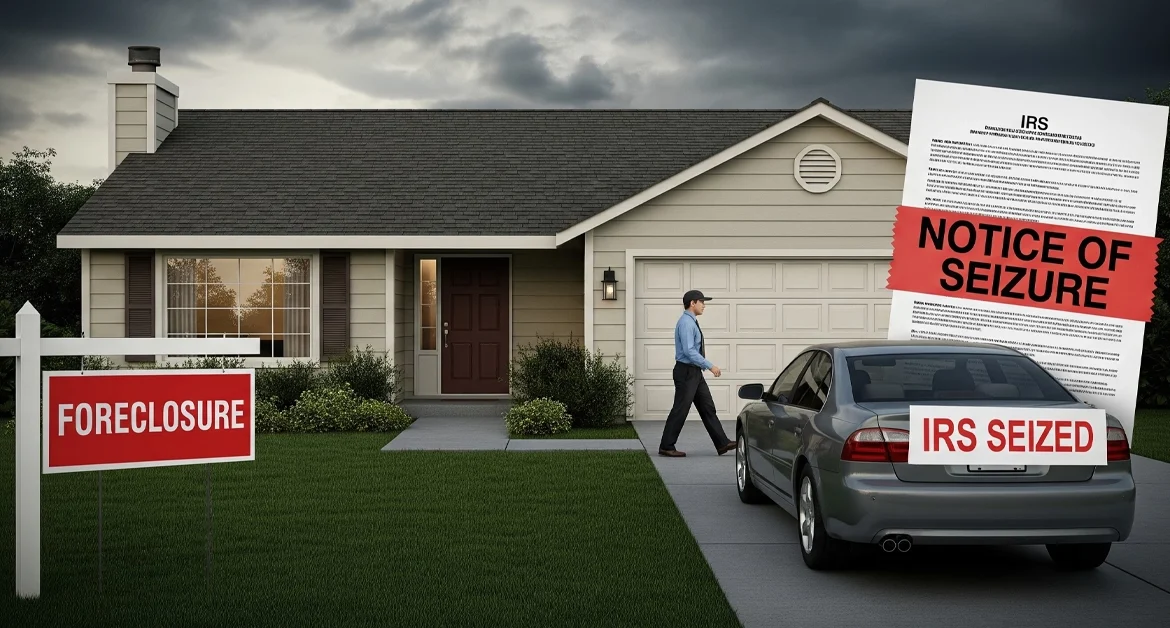The Short Answer: Yes, But It’s Rare
The IRS does have the authority to seize property — including homes and vehicles — when back taxes go unpaid.
However, these actions are extremely rare and reserved for severe cases. Before taking your house or car, the IRS must go through multiple steps, and many legal protections stand between you and losing essential property.
In addition, many states have homestead exemptions that protect a portion of the value in a primary home. While these exemptions do not stop the IRS from placing a lien or seeking a court order, they can limit how much value the IRS can collect from a forced sale.
What Happens Before a Seizure
The IRS cannot show up unannounced and tow your car or padlock your home. Seizure only happens after:
- The IRS assesses your tax debt and sends a bill.
- You receive repeated notices and demand for payment.
- The IRS issues a Final Notice of Intent to Levy.
- You are given 21 days to appeal or make arrangements.
If you respond during this window — by setting up a payment plan, proving hardship, or appealing — seizure is usually avoided.
Can the IRS Really Take My House?
Yes, the IRS can seize and sell real estate, including a primary residence, but only under strict conditions:
- Homestead Protections: Federal law requires the IRS to go to court before seizing a primary home. A judge must approve the seizure.
- Practical Rarity: Home seizures are uncommon because of the legal process and bad optics. The IRS usually targets bank accounts or wages first.
- Other Real Estate: Rental property, vacation homes, and land are more vulnerable since they lack the same level of protection.
- Key Reassurance: If you live in your home and respond to IRS notices, losing it to a tax seizure is highly unlikely.
What About My Car?
Cars, trucks, and other vehicles are easier targets. The IRS may seize and auction a vehicle if:
- You ignore notices, and
- The car has equity that can be applied to your debt.
That said, vehicles used for work (for example, a contractor’s truck) may be protected under tools of trade exemptions, which prevent the IRS from taking property needed to earn a living.
How This Connects to IRS Bank Levies
While the IRS has the power to seize physical property like houses or cars, it often starts with bank levies — freezing and collecting funds directly from your accounts.
If you haven’t read it yet, check out our guide on How to Stop an IRS Bank Levy and Protect Your Funds.
Understanding levies helps you see how the IRS prioritizes collections before moving to major assets like real estate or vehicles.
Protections That Work in Your Favor
Several laws and IRS policies shield taxpayers:
- Exempt Property: Clothing, basic household goods, unemployment benefits, and some retirement accounts cannot be seized.
- Court Approval: Primary homes require judicial approval before seizure.
How to Prevent Losing Your Property
If you’re worried about the IRS taking your home or car, the best step is to act early:
- Enter into an Installment Agreement or Direct Debit Plan to stop collection.
- Request Currently Not Collectible status if you cannot pay.
- Consider an Offer in Compromise if you qualify to settle for less.
- File an appeal within the 30-day levy notice window.
Bottom Line
Yes, the IRS can take your house or car, but in reality, seizure of major property is rare, highly regulated, and preventable. The IRS usually works with taxpayers who respond to notices and make arrangements.
Acting early is the best way to protect your home, car, and peace of mind.


